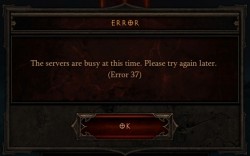Weekly News Roundup (10 June 2012)
Hello to you on this fine (or maybe not so fine) Sunday (may very well be Monday already, depending on how late this WNR gets sent out). A fairly quiet news week again, but like always, we shall persevere. My copy of Diablo III actually did arrive early this week, but I haven’t had much time to play it yet. The one time I did, the server had to go down for maintenance, which meant that my play session was not only cut short, but I also lost unsaved progress. The fact that a server maintenance could stop me playing the single player game doesn’t give me much confidence that, say 5 years from now, people will still be able to play this game without interruption (or even be able to play it at all). If game publishers insist on using “always-on” DRM, the least they could do is to guarantee the number of years that I’ll be able to play the game I purchased – 10 years would be ideal, but I suspect that this would cost quite a lot, and a lot of planning and risk management would be required to allow for this (eg. obsolete server software/hardware, and how this affects compatibility with the game server software).

Once again, we have mainly copyright news. That may sound strange considering E3 and everything, but really, I just couldn’t get that excited over this year’s event, since we already know much about the Wii U, and neither Sony nor Microsoft stepped up to the plate with an official announcement of their next consoles (although it hasn’t stopped the rumours from flying around).

Diablo 3's dreaded Error 37 has gotten the South Korean branch of Blizzard into trouble with the government
Anyway, copyright stuff. No, wait, back to the game stuff for a sec. Continuing the Diablo 3 theme from the intro, and the outro from last week’s WNR, Blizzard’s South Korean offices were raided by the country’s Fair Trade Commission (FTC) over issues related with Diablo 3’s DRM. Just like gamers in other parts of the world, South Korean gamers were also frustrated by the game’s launch day fiasco, and many went and sought a refund for the game. But the game’s terms and conditions apparently does not allow for refunds, and this is when gamers got the FTC involved. While this actual story is less about the DRM, and more about Blizzard’s refund policy, the issue of whether DRM problems can be counted as a “product fault” will be examined by the investigation.
As I said in the intro, there ought to be some guarantees for games that require server based DRM. An uptime guarantee, say 99% in any given month (which isn’t as impressive as it sounds – 1% of a month is about 7 hours, and that’s still quite a long outage), and a guarantee that the game will be supported for how ever long the game is expected to be played (if the next Diablo sequel is as long coming as this one, then 10 years ought to be just about right). If publishers want to make games into services, rather than products, then it’s reasonable for gamers to expect a certain level of quality of service. I feel though that the $50 gamers pay is no way near enough money to cover long term server support (hence why games like World of Warcraft have monthly fees), so I don’t expect games like Diablo 3 to be playable in 5 year’s time, unless the in-game purchases can keep the servers running. And in the same way, game publishers should understand that this kind of DRM can be very expensive over the long term, and they need to consider whether it’s worth it financially or not.
Last week, the RIAA accused Google of not doing enough on DMCA take-downs, and instead, want the search engine to perma-ban sites like The Pirate Bay, as opposed to having to constantly submit DMCA notices. This week, The Pirate Bay responded by welcoming any blanket bans of torrent indexers, saying that this would actually boost traffic numbers for the world’s most popular indexer. The reasoning is that, as the biggest brand in torrents, TPB would suffer much less from the removal of Google referrals (which they say, at best, only accounts for 10% of their traffic) compared to other torrent sites. Whereas Google often still redirects people to other less well known torrent sites, if Google stopped showing torrent results, this could mean more and more people would simply bypass Google altogether and log straight on to TPB. What’s bad for other indexer (and in a way, Google as well), will ultimately be good for The Pirate Bay, since you have to pretty naive to think that just because Google can’t provide you with torrent results, that people would still stop pirating.
And TPB’s IP address war of attrition continues. With last week’s newly released IP address just added to the banned list, a new IP address has been released – 194.71.107.80 becomes 194.71.107.81 (the old IP address will still continue to work in countries without the censorship). So round 2 begins, and I wonder how many rounds BREIN, the Dutch anti-piracy agency, will last before they start whining again. The TPB has also jumped on the IPv6 bandwagon, meaning those that have migrated over to the new IP address system will have a new way to access TPB, one that’s not blocked (so far) by any filters (as most failed to take into account IPv6). Plus, you can use one of the many IPv6 to IPv4 tunnel services as a pseudo-proxy to bypass the filter too, for example, thepiratebay.se.ipv4.sixxs.org. Just goes to show how pointless these multi-million dollar filtering implementations are, but if they want to play the IP merry go around in the IPv6 domain, then I’m sure TPB will gladly oblige too.
Those caught in the crossfires of the US government’s war on Megaupload, that is those that had used the cloud hosting service legally, may yet get back access to their files, after the MPAA signalled it had no general objections against the idea. However, it did have some specific objections, in that they don’t want anyone involved with Megaupload to be handling any system for (legal) file retrievals, and they also want to ensure only legal content can be downloaded. While probably reasonable requests, how practical meeting them would be is a different question altogether. I can’t see the required time, effort and money being spent to build a system which would allow for this, and the MPAA rightly says that even Megaupload’s user policy doesn’t guarantee continued access to stored files. The lesson here is that while the cloud is a great idea, and it’s made things very convenient, backups stored in multiple locations, ideally offline too, is still as important as ever.

Legal options for hit show like Mad Men are very limited here in Australia - and if I was feeling mean, I could post another picture of Lane Pryce that would be a huge spoiler for those who haven't seen the latest episode
And finally, an Australian online survey has found that 1 in 10 have stopped pirating film and TV content, and most say the availability of more legal options was one of the reasons they’ve stopped. There were also some other interesting findings. Only 10% of those surveyed downloaded pirated TV shows and movies on a weekly basis, and out of this group, 72% say they’re doing it because there’s simply no legal alternative available. Being in Australia, this is a fairly accurate reflection of the legal scene, especially for TV based content, and for hit shows like Game of Thrones or Mad Men. Someone here (or there, in the US) is making deals (and profiting greatly from it) that’s ensuring we only get time delayed releases. That may have worked in the past, but in this day and age, even a 24 hour delay might as well be an eternity. Both considering how quickly the same content is available via the illegal channels, as well as the spoiler-ridden and at the same time, ubiquitous, nature of the Internet itself.
Or “there’s no legal option” could simply be an excuse – a convenient one because it’s mostly true, but still believable to use when it isn’t (for example when the content is available on iTunes at extortionate prices, although you could argue about the viability of such an option). I think anti-piracy really has to be about getting rid of these excuses first, by providing legal options (at a price that makes it a viable option), and once you make piracy simply a moral decision and one that’s solely based on the fact that the content is free, then at the very least, the rights holders would have more justification to implement tougher piracy prevention methods (being careful not to create new excuses in the process).
And so we come to the end of another quite short (and late) WNR. Can’t be helped I’m afraid. Well, it can, but that would require too much work (or just work), so no, it can’t be helped. See you next week.
